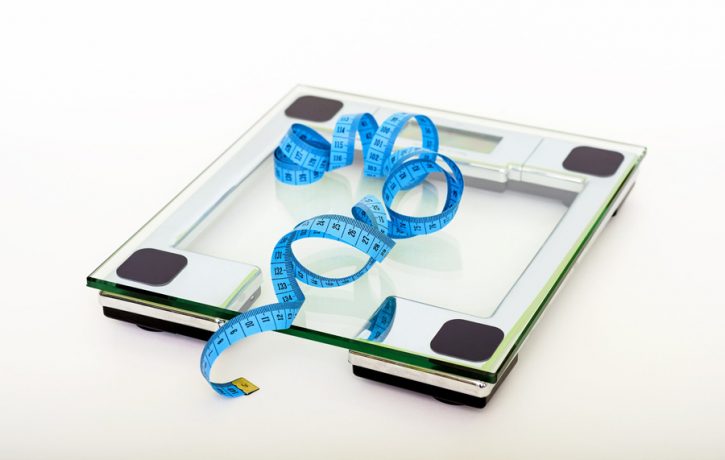in Nutrition
7 Reasons Why You Are Not Losing Weight

Many of my clients come to see me, because they are looking to lose weight. As a nutritional therapist I know that overweight and obesity can contribute to a number of chronic health conditions in the long run, and that weight loss is much more than the resolution to a merely cosmetic issue. I support my clients – either 1:1 or in small groups – through nutrition advice and motivational coaching. More often than not they walk away not just lighter than before, but with a health benefit they hadn’t expected: joints don’t hurt anymore, they sleep better, their mood has improved, their hormones are balanced.
With my guidance, my clients lose weight slowly, but steadily, while we are monitoring their body composition. But sometimes, weight loss stalls even though it seems that they are doing everything right. Here are the most common reasons for this that I’ve come across:
#1 You are counting calories
I merely ask my clients to keep an eye on the glycaemic load of the food on their plate, not to count calories. It is high blood sugar and insulin that leads to weight gain, not ‘calories’ as such. But the fear of high-caloric foods (e. g. avocados, oily fish, nuts and seeds) and the idea of ‘calories in must be less than calories out’ is so entrenched, that many continue to count calories anyway. The problem is that when you are following a very low-calorie diet, you are lowering your basal metabolic rate (BMR) – the amount of energy your body consumes at rest – with the result that from then onwards, fewer calories than before will lead to weight gain.
#2 You are eating low-fat products
In an effort to control calories and eat healthily, many people have switched to ‘low-fat’ products, because after all fat has more than twice the amount of calories of carbohydrates – even sugar – or protein. So, cutting down on fat means a significant reduction of calories. But ‘a calorie is not a calorie’. What matters is what happens to the food inside our body, and here, it is really sugar that does a lot more damage and promotes weight gain. The trouble is that low-fat products tend to be high in sugar. The removal of fat means the removal of flavour. Sugar helps to keep low-fat foods palatable. Given the choice, I’d always go for fat instead of sugar.
#3 You’re exercising, so you can eat more!
You’ve gone to the gym, you’ve run on the treadmill, you’ve swam for an hour … and food is your reward. After all, you have just burned thousands of calories. (Those pesky calories again!). Machines in the gym and personal activity monitors display the calories burnt from activity and the numbers tend to be disappointingly low. But again: Calories are not the culprit. Sugar is, and you cannot outrun a poor diet. Exercise improves your general fitness, stamina and body composition. Building muscle helps increase your BMR. All of this will help streamline your figure, but it is important to focus on what you’re eating to make sure that you replenish your energy stores and nourish your aching muscles without resorting to sugary foods that can turn into fat again.
#4 You are not drinking enough
A feeling of hunger can be a signal of dehydration. It might simply mean that you are thirsty. Have a glass of water and wait 20 minutes. If you are still feeling hungry, eat.
#5 You are drinking your energy
You may watch what you are eating and have the perfect diet, with good amounts of fats and proteins, low in fast-releasing carbohydrates … but have you considered your drinks? Unless you are just drinking water, tea, coffee – without added sugar or sweeteners -, or herbal infusions, your drinks contribute to your weight: fizzy drinks (regardless of whether they are sweetened with sugar or artificial sweeteners), fruit juices, shakes, milk, sports and energy drinks, alcoholic drinks. All of the above increase blood sugar levels and promote weight gain.
#6 You’re not counting little bits here and there
When I work with clients, I ask them to keep a food diary. Many who thought that they have a fairly healthy diet find this very revealing. Having to write down everything that passes their lips focuses their mind. When before a piece of chocolate, a biscuit, a tablespoon of ketchup went below the radar, they are now becoming aware of it. My clients frequently report that just keeping the food diary helps them lose weight, simply because writing things down has drawn such sneaky sugary snacks and condiments to their attention. As most people don’t even notice having that biscuit they figure that they are not going to miss it much. And they don’t!
#7 You’re stressed
The stress hormone cortisol has the power to unlock glycogen (stored sugar) from your liver and muscles, thus raising blood sugar levels. This mechanism was designed to help us fight or flee when confronted by a hostile tribe, even if we hadn’t recently eaten. Glycogen is our emergency supply, and it gets released when we are stressed. Even though our stressors today are not usually life-threatening, the stress response is still the same as it was thousands of years ago: Cortisol is released, blood sugar levels go up. Try and remove as many stressors as you can, apply relaxation techniques to deal with the stress you cannot do anything about to help prevent these blood sugar surges.
- Understanding Diabetes - 25th May 2018
- The Body Matters’ Nutritionist working with John Lawson - 5th April 2018
- Expect More than Weight Loss - 23rd March 2018
